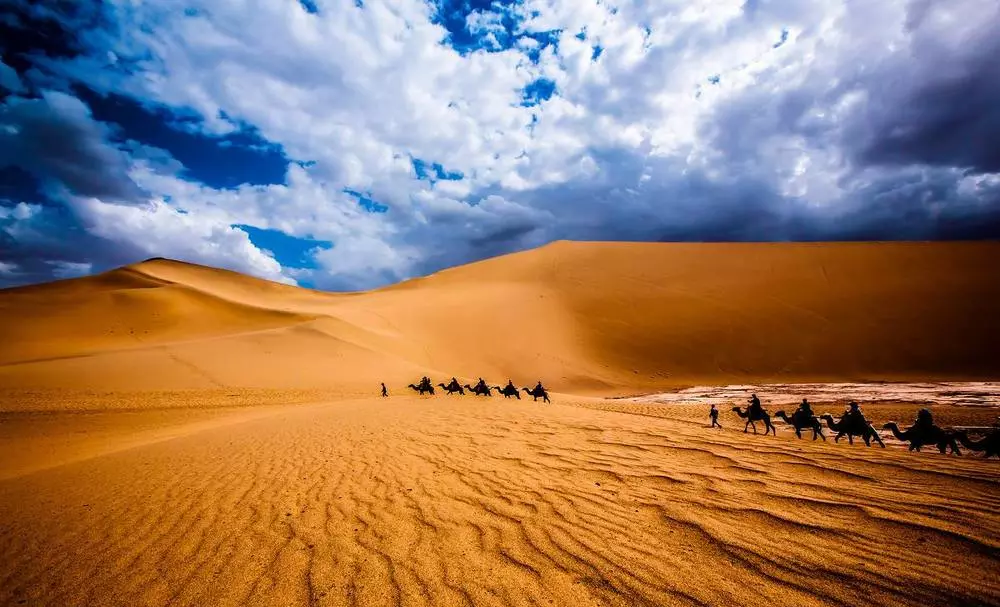Camel trumpet
Oops.
Wow,
Get up!
The camel man has been walking through the gates for many years,
Ding-dong, go to the gate!
Go to the gate! Ding-ah-he-hee!
This is a camel trumpet, deeply loved by generations of camel guests in Minqin County, Gansu Province, from the Ming Dynasty to the present, it has been more than 600 years, is the unique cultural relics of Gansu Province and even the whole country.

The ancient road is long, and the sunset melts gold. In the vast desert, a caravan of camels walks in the depths of the years, walking calmly and with determined eyes. The camel bell of "Ding-Dong" and "Ding-Dong" travels through the long history of poetry and echoes in the sky of history.
Minqin ancient name Zhenfan, located in the northeast of the Hexi Corridor, east and west on three sides by the Tengger and Badain Jaran two major deserts, is the famous "camel town", the breeding of envoy camels has a long history, ancient "Han Ma Tang camel" said.
Minqin people not only raise camels, but also use camels as an important land transportation on the ancient Silk Road, and those who have been industrious and brave in charge of camel caravans on the Silk Road for generations are called camel passengers, and they have formed some specific rules and customs in long-term transportation, which have been followed for a hundred years. They and their caravans made an important contribution to the trade of goods on the Silk Road and the spread of civilization. In 2011, Minqin Camel Guest was announced by the Gansu Provincial People's Government as a provincial intangible cultural heritage list item.
Minqin camels travel south and north all year round, and the Minqin camel caravan routes are in all directions, with a wide range of activities, traveling tens of thousands of miles, round-trip for several months to half a year. Minqin camel guests traveled all over the northern region radiated by the Gansu section of the Silk Road, leaving a distant back in a foreign country.
In the more than 600 years of historical inheritance, minqin camel guests have formed a set of unique organizational forms, cooperation rules, lifestyles, survival skills, communication methods, and customs in the arduous trek of wind and food and camping. Camel guests are a group with a clear division of labor and unity and cooperation, which is divided into a house leader, a horseman, a pot head, a water head, a zipper, and so on.
It generally takes 30 to 50 days for camels to deliver goods, and it takes two years for long-distances. Therefore, it is necessary to master camel training, nose sticks, camel adjustment, formation, loading, path exploration, windy weather identification, tracking, search for water sources, well building, standing photo, wind and snow camping, fire, wolf prevention, camel guard, treatment of common diseases between people and camels, production and repair of utensils, exchanges and trade with foreign races in different places, and many other travel and wild survival skills and skills. These are all valuable experiences accumulated by a large number of camel guests in the long-term practice of successive generations, and they are "treasure books" and examples of harmonious coexistence between man and nature.
The legends of the Minqin camel caravan formed in this process mainly include the legend of the "imperial camel," the legend of the Majia camel caravan, the legend of Ma Yongsheng, the legend of the Minqin camel caravan participating in counterinsurgency, the legend of the "protector of the country," the legend of the Minqin camel dart, the legend of Lenin meeting the Minqin camel caravan, the legend of the Minqin camel escorting the Panchen master, the legend of the Ma family camel team saving Youren, the legend of the Ma family camel team donating planes to support the War to Resist US Aggression and Aid Korea, and so on.
Minqin camel guests sang in the Camel Road the camel trumpets such as "Camel Man Trumpet" and "Pull Camel" written and sung in the Minqin dialect. The tune is majestic and high-pitched, the rhythm is soothing, the singing voice is rough, the quaint vicissitudes, often coincide with the regular pace of camels and the rhythmic bells of camel bells, deeply loved by generations of people who are diligent camels, from the Ming Dynasty to the present, it is a strange thing in the treasure house of northwest folk music.
As a special group, Minqin camel guests have written a difficult and brilliant history on the long camel road, forming the spirit of patriotic and prosperous, diligent and loyal, wisdom and bravery, benevolence and integrity.
The Minqin camel caravan has important significance and influence on the material life and spiritual culture of the Minqin people, not only for the introduction of daily necessities for the Minqin, expanding foreign trade, the local products of the Minqin, and promoting the development of commercial goods, but also because the camel caravan is mostly desert and no man's land, in the long-term transportation, the Camel passengers of the Minqin have gradually accumulated various experiences in the survival of the wild, cultivated and tempered the strong and indomitable will and the spirit of bearing hardships and standing hard work of the people of Minqin.
With the development of modern transportation industry, camels and camel guests have gone away from people's memories, "camel guests", hair-planting mattresses, foot pedal felt, sheepskin jackets, torches, melodious camel bells, crisp bells have become the memories of the older generation, and young people can only glimpse the glory of the past in the literature. Today, camels, camel bells, etc. are still alive in front of the world as props for tourist attractions.
Source: Ruyi Gansu Lixiangxing